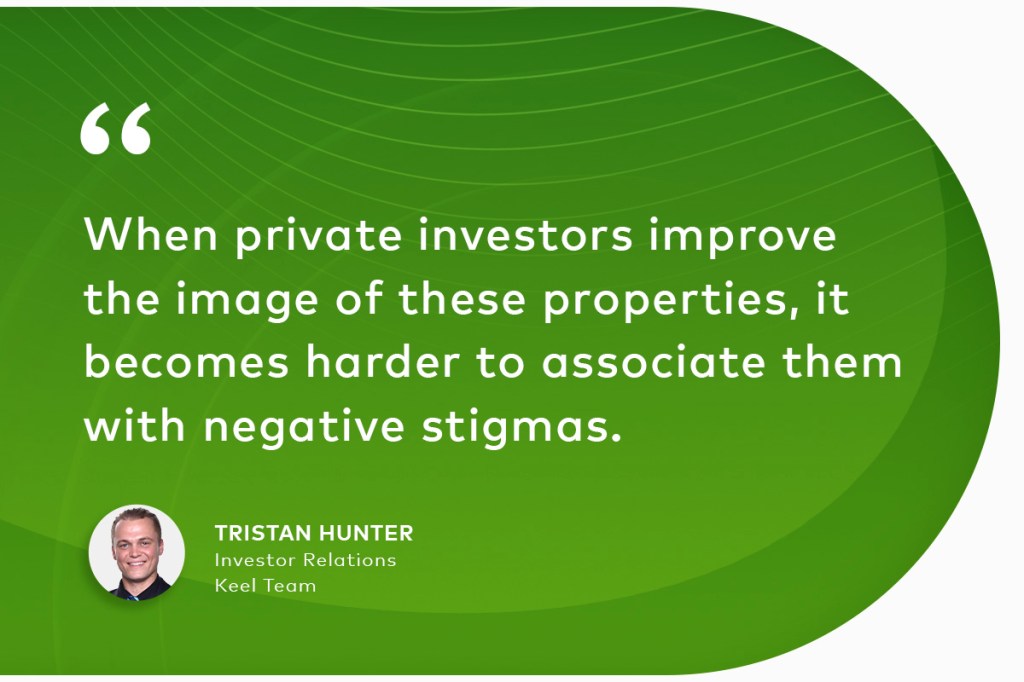
Tristan Hunter is in charge of investor relations and SEO at Keel Team, a mobile home park investment and management company.
Keel Team’s goal is to preserve affordable housing while improving the lives of park residents and providing significant returns for their investors. Tristan is passionate about the manufactured housing market, seeing it as a space with a lot of growth potential. He talked to us about the current state of an industry on the frontier of affordable housing, tech needed to run a successful business and why this work brings him so much joy.
Meet Tristan Hunter, Keel Team
Interviewer: Tell us a little bit about your background and what Keel Team does.
Tristan Hunter: After getting my Bachelor of Science in Real Estate, I worked in construction for a while, then became a real estate agent. I’ve been in the mobile home park market for just over a year now. I’m thoroughly enjoying it. Real estate is where I come from and likely to stay for the rest of my career.
Keel Team was founded by Andrew Keel in 2015. He started by flipping single family homes, fixing them up and selling them for profit. He then bought two mobile homes under contract but didn’t know what to do with them. He went on YouTube, came across a book by Lonnie Scruggs called Deals on Wheels, and started “Lonnie dealing,” flipping individual mobile homes.
Through this, he met a park owner who introduced and mentored him in the mobile home park syndication model, and the rest is history. We currently own 45 mobile home parks across more than 10 different states. We have over 30 full-cycle deals, which have always returned investor capital.
Manufactured housing today
Interviewer: What is the state of manufactured housing today?
Tristan: It’s exciting! The demand for manufactured housing is increasing as the price of traditional homes increases, making this more affordable for a large part of the population. There is a negative side, but there’s also a massive positive side.
The negative side is the stigma attached to manufactured housing communities. It’s very difficult to build new mobile home parks because municipalities don’t approve the zoning. There are lots of regulations.
The positive side is that private investors are coming in and uplifting these communities, upgrading them and also improving the lives of the residents.
As far as demographics today, there is a diverse mix of tenants. The majority are ages 40 and up, but a large number of younger people are starting to occupy mobile homes. The current price of traditional housing makes homeownership quite unrealistic for many young people. This helps bridge the gap for affordable housing. It offers them a chance to own a home, have pride of ownership, have their own yard and enjoy a high quality of life.
Who is investing in manufactured housing?
Interviewer: Who is investing in and building out these communities?
Tristan: The changing dynamics in manufactured housing are attracting a new breed of investors. Traditionally, mobile home parks might not have been seen as prime investment opportunities due to the stigma and regulatory challenges. However, with rising housing costs and increasing demand for affordable living, private investors are now seeing the potential for strong returns and social impact.
Younger demographics moving into these homes are particularly appealing to investors who recognize the long-term stability and growth potential in these communities. As a result, we are witnessing more investment in infrastructure, amenities and overall living conditions. This typically enhances the value of the properties and fosters a sense of community and pride among residents.
Land lease model of ownership
Interviewer: Why is the land lease model popular for investors?
Tristan: There are two main models when looking at mobile home park ownership: the park-owned home model, where the park owns all the homes, and the tenant-owned home model, where tenants own their homes. The tenant-owned home model is popular because, as the investor or park owner, you own the land and the residents rent the lots. A group like Keel Team will invest in the land and get our revenue through lot rent, while the residents own their homes.
We initially use a hybrid approach. Many parks we buy have vacant lots or homes that need rehab. If a home is worth rehabbing, we’ll fix it up, rent it out as a park-owned home and convert it to a tenant-owned home once we refinance the property. We do the same with new or used homes we infill on vacant lots. We convert them by selling them on a rent-to-own agreement to the tenant with only a small down payment. This helps the residents as well.
Ultimately, we aim to get all homes to be tenant-owned by the time we refinance because it’s overall viewed as a more stable model by lenders, and it typically reduces maintenance responsibilities and tenant turnover.
Manufactured housing & technology
Interviewer: How well is MH adapting to changing technologies?
Tristan: From an operational standpoint, everything behind the scenes is fully online. While we have a corporate office with people on-site, many of us, like me, work remotely. I’m based in South Africa and handle everything remotely for the company. Many asset managers do the same.
In terms of hardware, we’re adapting to changing technology. For instance, smart meters are becoming very popular. We install a smart meter on every home, allowing us and the tenants to track consumption remotely. If there’s a leak, we get notified immediately and can fix it, preventing wasted water and money. With smart meters, we’ve seen a 30% decrease in residents’ water consumption, promoting more sustainable practices.
Overall, we’re always looking for technologies that increase operations and efficiency because we want to achieve economies of scale, increasing production at a lower cost. Any technology that helps us do that is something we’re likely to pursue.
What’s needed in property management software?
Interviewer: What features are park managers looking for in their tech?
Tristan: Park managers are increasingly looking for tech solutions that streamline operations and improve efficiency. Key features include robust property management software that handles billing, maintenance requests, and tenant communication seamlessly. We also value tools that offer data analytics to track occupancy rates, rent collection, and maintenance costs. It’s important to have security features, such as surveillance systems and access control. Additionally, managers seek user-friendly platforms that can integrate with other systems, provide mobile access and support regulatory compliance, making their tasks more manageable.
Investing in a social community
Interviewer: In terms of socializing, what makes a manufactured housing community different from an apartment community?
Tristan: I’ve lived in an apartment before, so I know exactly what it’s like. Typically, you go to work, come back and you’re in a four-wall building with a small balcony or window. It’s very secluded and confined to that type of existence. In a mobile home park, you have your home and a yard. Your neighbors have the same, so you more naturally integrate with each other.
Not only that, but there are community events like barbecues and fun days where you can interact with your neighbors. This isn’t always common in apartments, where you live in your little block and oftentimes hardly know your neighbors. In a manufactured housing community, people actually know each other and integrate on a regular basis.
Public perception
Interviewer: Are there things that turn people off from mobile homes, and what can the industry do to win people over?
Tristan: Yes, there are a few things that turn people off from mobile homes. The stigma is a big issue. Municipalities often resist mobile home parks because they see them as loss leaders in terms of taxes. To win people over, the industry needs to focus on education and awareness.
At our company, we’re trying to educate our audience about the benefits of mobile home communities. The fact that more private equity investors are coming into the field is also helping. These investors are improving communities and preserving affordable housing, which is a crucial solution to the affordable housing crisis. Mobile home parks generally have the infrastructure, but they need investment and care to thrive.
Through time, awareness and education, we can change perceptions. When private investors improve the image of these properties, it becomes harder to associate them with negative stigmas. Instead of thinking of rundown parks with trash and dirt everywhere, we focus on improving that image overall by maintaining clean, well-kept communities. We screen tenants and bring in qualified working professionals. By improving the curb appeal of our parks, as well as our online presence, we can shift public perception and win people over.
Supply & opportunity
Interviewer: What are you seeing from the supply side and prices right now?
Tristan: The supply is contracting because more parks are being redeveloped for different land uses than those that are being built. Naturally, the demand is also increasing as the supply contracts, which generally increases prices. With that being said, there are also a large number of parks that are owned by mom-and-pop owners who have neither increased lot rent in years nor upgraded anything in eons.
Generally, these parks have deferred maintenance and are in need of some TLC. That’s where we come in. We target these types of communities, improve the management efficiencies, enhance the overall presence of the park and establish market-rate rents as a value-add initiative. This is always done with respect to the residents. We implement small increases over time rather than huge hikes that many could not afford.
Difficulties in manufactured housing management
Interviewer: What are some of the difficulties in managing MH parks, and how can these be addressed?
Tristan: In real estate, there are difficulties in terms of rent collections, tenant issues, violations, etc. This is why we have excellent software and on-site management in place to run the park as effectively as possible. We have a team assigned to improving these metrics to ensure the business plan and targets are being met.
A bright future ahead
Interviewer: What keeps you optimistic about the future of manufactured housing?
Tristan: The fact that manufactured housing is catching on and more investors are getting involved keeps me optimistic. While some investors are just in it to make money, a lot of them genuinely want to have a mutually beneficial relationship with their investments. They aim to improve the lives of the residents while also generating a decent return.
There’s a lot of opportunity in this space. That’s why I do what I do, and it’s why I’m with the company I am. We represent positive values, and we only work with investors who want to preserve affordable housing. That’s something I stand for, and it gives me hope for the future of manufactured housing.



